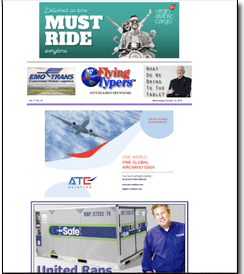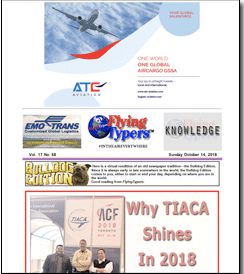|
October 2018—I am sitting in the United Airlines Corporate Support
Center – specifically the headquarters of United Cargo’s worldwide
business located on the 17th floor of the Willis Tower in Chicago.
Later, as we travel upstairs to the 103rd floor of this great building,
I am thinking that towers like the Willis, the Empire State Building in
New York City and the Eiffel Tower in Paris cannot help adding a spirit
of triumph to the soul.
When you are 103 floors up in the Willis Tower your vision is in heaven,
and at the same time the space offers a calming perspective of the world
below.
Skyscrapers and towers are a celebration of what mankind’s ambitions
have achieved and a joyous declaration that we exist and have survived.
So I wonder, now that he has spent the past four years at Willis, what
impact has altitude had on the attitude of United Cargo President Jan
Krems and his team?
FlyingTypers: You have been in place atop United
Cargo for some time now. What surprised you?
Jan Krems: “I’ve
often talked about what I found when I came to United and what we did
as an organization to turn things around. But after four-plus years, the
key to our ongoing success story is the team we’ve all built together.
“I think we have the perfect blend of people at the beginning of
their careers, with high-level expertise in data and technology, and more
senior staff who’ve seen everything this business can throw at them
and lived to tell the tale. It’s the balance between enthusiasm
and experience, visionaries and veterans, that keeps things interesting
and fresh.
“There’s another factor we’ve consciously focused on,
because it’s often overlooked: keeping the spirit of fun and adventure
alive throughout the enterprise. We take keeping our promises to our customers
seriously, but we don’t take ourselves so seriously.
FT: What
are some of the keys to success at United?
JK: “A
linchpin of our sustained strength is our team’s emphasis on cultivating
long-term partnerships with customers. Our aim has been to build relationships
of mutual benefit built on trust. We look for partners who share our eagerness
to listen and our passion for contributing to the other partner’s
success.
“Of course, customers won’t
remain your partners unless the quality of your people is matched by the
quality of your service. That’s why our relentless focus is on delivering
quality service at all our locations worldwide. We know that consistent
quality is the key to preserving and expanding customer relationships.
FT: In
terms of business what is your top agenda item right now?
JK: Our
top agenda item is ensuring we sustain reliable quality throughout the
upcoming peak season. All though 2018, we’ve taken the lessons learned
from last year’s peak and translated them into people, process and
facility adjustments in key locations around the system – for example,
at our crucial U.S. hubs in San Francisco and New York/Newark. As volumes
ramp up, our mission is to refine the process enhancements to ensure we
meet the peak shipment levels with peak efficiency.
FT: What
does the rest of 2018 look like?
JK: “As
the carrier with the largest China-U.S. network, we’re obviously
concerned about the effect of escalating trade tensions on the robust
peak season we’re expecting. Based on our conversations with customers,
our forecasts and our booking levels, we expect trade issues, to whatever
degree they impact air cargo, to be more of a factor in 2019.
“There’s a lot of upward momentum
heading into the fourth quarter. There are headwinds to be concerned about
– for example, air capacity has outgrown demand for the past six
months. And yet, while these obstacles have
surfaced all during the recent growth period, our overall industry continues
to expand.
FT: Right
now, what types of commodities can use United Cargo to best advantage
all around?
JK: “A
highlight of our business in 2018 is the continuing global growth of our
TempControl service for pharmaceuticals, healthcare material and other
commodities requiring temperature-sensitive shipping. This contributes
to our bottom line, of course, but what’s most gratifying is that
a greater number of customers are trusting us with more and more of their
healthcare business, allowing us to contribute to the health of more patients
worldwide.
“We use the terms “relevance”
and “integrity” as watchwords for differentiating TempControl
from other carriers’ cool chain products. The essence of integrity,
of course, is keeping the commitments for quality and timeliness we make
to our customers.
One way we enhance TempControl’s relevance
is to expand our customers’ options for packaging and transport
systems – and 2018 has been our best year for this effort.
“In July, we signed a global lease
agreement with Sonoco ThermoSafe that enables TempControl customers to
lease PharmaPort 360 containers directly from us. In September, we enhanced
both our TempControl and LifeGuard services by accepting the evo®
Cold Chain 2.0 system developed by Savsu.
“Then just last week, we became the
first U.S. carrier to approve the new CSafe RAP active container, which
enables us to meet the demand for more pharma capacity on our network
using the same CSafe technology our customers have trusted since 2010.
FT: Would
you describe some things all of us in air cargo can do better?
JK: “While
the reliability and efficiency of air cargo is improving, the arrival
of another peak season will test the limits of the infrastructure around
some airports. These limits, and the timeliness and consistency of all
the processes leading up to and following the freight’s air transport,
continue to challenge air cargo’s value proposition.
“What’s needed to maintain standards
and lessen the impact of congestion is better planning and more consistent
and effective responses to the inevitable irregular operations. More investment
in the facilities and logistics needed to support specialty cargo would
also be a major benefit.
“This is another of our challenges
that is best confronted by unified industry action. We need to speak with
one voice to persuade governments and airport regulators that air cargo
makes crucial contributions to the success of their economies, and that
investments and policies that benefit air cargo make good business sense.
Geoffrey
|




 Vol.
17 No. 67
Vol.
17 No. 67 Vol.
17 No. 68
Vol.
17 No. 68